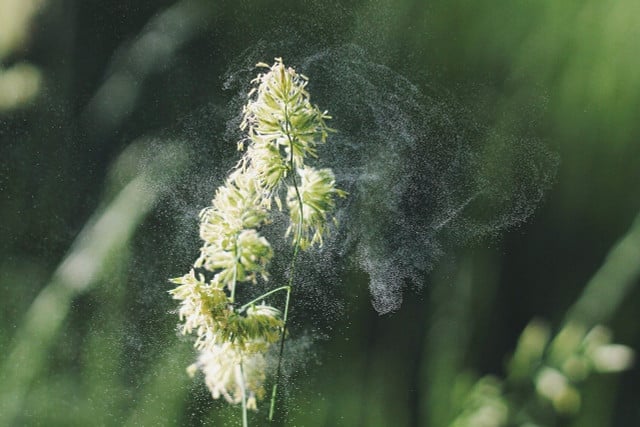
Mugwort is a popular spice and remedy. But mugwort can also trigger an allergy. Which symptoms can appear and which home remedies help.
The common mugwort (Artemisia vulgaris) comes from the daisy family and, with its yellow-green flowers, is widespread and mainly found on embankments, roadsides and gravel areas. The plant blooms from mid-May to late October. The burden of mugwort pollen is particularly high from mid-July to the end of August. Unfortunately, people with a mugwort allergy are particularly affected by symptoms during this period.
By the way: people without a mugwort allergy can benefit from the plant, which is also used as a natural remedy: it is said to have antibacterial, circulation-enhancing and digestive properties. With its spicy aroma, mugwort is also often used as a spice in various dishes.
Mugwort allergy: the typical signs

(Photo: CC0 / Pixabay / Free Photos)
The pollen of the mugwort plant, which can be up to 200 centimeters tall, is spread by the wind and causes the most common herb pollen allergy in Germany.
Possible symptoms of a mugwort allergy correspond to those of common hay fever:
- Tearing and itching of the eyes
- runny nose
-
Headache
- shortness of breath
- tiredness, exhaustion
- sleep disorders
The so-called “ragweed” (also: mugwort ragweed, Ambrosia artemisiifolia) is also said to be at great risk for severe allergic reactions. This is to be distinguished from common mugwort. Ambrosia is very similar to it but has smooth and green undersides of leaves. But be careful: Anyone who is allergic to mugwort often reacts to ragweed with hay fever!
Mugwort is considered the leading allergen for other allergies
If allergic reactions occur with mugwort pollen as a composite plant, other composite plants can also cause such undesirable symptoms. These are the so-called cross-reactions.
According to the European Center for Allergy Research Foundation (ECARF), symptoms associated with mugwort allergy are common. For example, eating celery, spices, cucumber, melon, or even bananas can trigger allergic reactions. What is striking here is that the corresponding foods are often better tolerated if they are heated up beforehand. The heat destroys the allergens.
Home remedies for mugwort allergy
Not only medication, but also home remedies can alleviate the symptoms of a mugwort allergy:
- A nasal rinse with a saline solution can help wash the pollen from the nasal lining. The solution also moisturizes the nasal mucosa, which reduces itching.
- A damp cloth can help with itchy eyes. Simply moisten with cold water and place on both eyes. This often relieves the itching.
- Since pollen mainly gets caught in the hair, it is advisable to wash your hair out, especially before going to bed.
- You can find more tips here: Caution: This can aggravate allergies
Read more on Utopia:
-
Ragweed allergy: symptoms and treatment
-
Cross Allergy: Types, Symptoms, and What You Can Do
- Food Allergy: Symptoms, Types, and What to Do About It